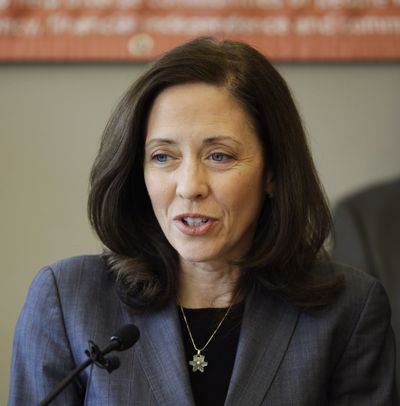Cap-and-trade alternative sought
Cantwell concerned traders could manipulate program for profit

WASHINGTON – A growing number of lawmakers who are deeply involved in the effort to reduce greenhouse gases and global warming are beginning to question “cap-and-trade,” the current hot-button solution to the problem.
The chair of the Senate Energy and Natural Resources Committee’s energy subcommittee, Sen. Maria Cantwell, D-Wash., says she isn’t so sure the “cap-and-trade” approach favored by the White House, environmental groups and many of her Democratic colleagues is the way to reduce carbon dioxide emissions from coal-fired power plants and other industries. She fears that it could lead to the same type of unregulated Wall Street money-making schemes that fueled the current recession.
“I have serious concerns about how a cap-and-trade program might allow Wall Street to distort a carbon market for its own profits,” Cantwell said in an interview.
Cantwell and others are leaning toward a system, dubbed cap-and-dividend, that would cap carbon dioxide emissions and require companies to pay for their credits or allowances. The money raised would be distributed to taxpayers, who likely would face higher utility bills as utilities pass along the added costs of curbing greenhouse gases.
“We are looking at ways that would allow consumers to get something back,” she said.
Congress returns from its spring recess this week with energy and climate change near the top of its legislative agenda.
The House Energy Committee, with 59 members who come from every part of the country and represent all political persuasions, is expected to consider a climate change bill in the next month or so.
Cantwell is one of a growing number of lawmakers who are tinkering with the cap-and-trade approach, including Reps. Chris Van Hollen, D-Md., the chairman of the Democratic Congressional Campaign Committee; Jim McDermott, D-Wash.; and Lloyd Doggett, D-Texas. Other Democrats have proposed an outright tax on carbon dioxide emissions, which Republicans were quick to criticize.
Cantwell has experience in these issues. She helped blow the whistle on Enron and other companies that manipulated electricity markets. She’s railed against natural gas and oil companies that she thinks have maneuvered to drive up prices and reap record profits. She thinks the agencies that might regulate the carbon trading markets, the Federal Energy Regulatory Commission or the Commodities Futures Credit Commission, are toothless.
The Europeans already have created a cap-and-trade market for carbon dioxide emissions. Credits are being bundled by financial institutions such as Credit Suisse and sold to investors in much the same manner as mortgage-backed securities and other exotic financial products whose collapse helped lead to the global financial crisis, Cantwell said.
“We all know the problems with these derivative markets,” Cantwell said.
One recent report warned that trading in carbon credits and derivatives could grow so quickly that it would create a “carbon bubble” that could burst and create another major global financial meltdown.
“Today speculators do the majority of carbon trading, and they will continue to dominate as carbon trading markets grow,” said the report from the environmental group Friends of the Earth.
The report said that without proper regulation, the markets soon could be offering “subprime carbon” investments or “junk carbon” offerings.
“Carbon-trading firms have strongly advocated self-regulation as a way to govern this market, and most cap-and-trade bills implicitly reflect this mode of governances,” the report said.
Another group lobbying for a cap-and-trade bill, the Environmental Defense Fund, thinks the regulatory issues can be worked out.
“We need to make sure market manipulation doesn’t occur and that any scofflaws out there are punished,” said Steve Cochran, director of the Environmental Defense Fund’s national climate campaign.
Cochran, however, said the cap-and-trade approach would ensure a maximum amount of capital would start flowing to pay to upgrade existing plants or build more efficient new ones.
While Cantwell would like to see a comprehensive energy-climate change bill pass this year, she isn’t opposed to doing it in pieces. The Senate Energy and Natural Resources Committee is expected to consider legislation in the next few weeks that would set targets requiring utilities to increase the development of alternative sources of energy and set energy efficiency standards for such things as appliances.
“We are doing the softball stuff,” she said. “My philosophy is get what you can, keep the ball moving, and holding it up for one mega-thing can be a mistake.”